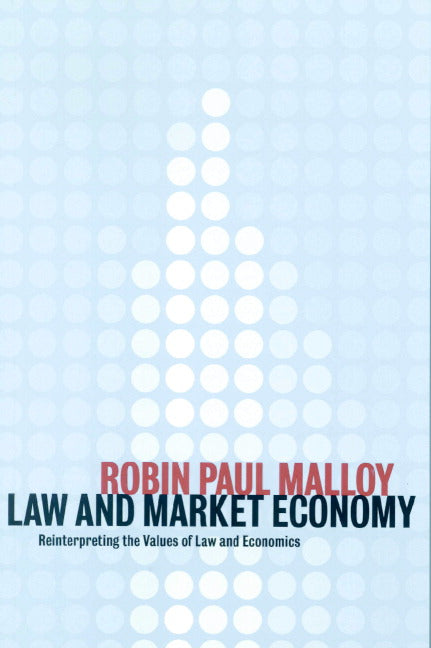Freshly Printed - allow 8 days lead
Couldn't load pickup availability
Law and Market Economy
Reinterpreting the Values of Law and Economics
Law, market theory and semiotics together provide a challenging new perspective on economic analysis of law.
Robin Paul Malloy (Author)
9780521787314, Cambridge University Press
Paperback, published 10 August 2000
190 pages
22.8 x 15.3 x 1.3 cm, 0.27 kg
'… it is clear that [Malloy's] concept of Law and Market Economy is rich with potential. As he develops his theory, he has the opportunity to work out a template for action in the processes of the law that can lead to a welfare-maximising society that would be a compelling alternative to the failed Welfare State of the immediate past, the Efficient State, instrumental to the economic elite, of Chicago School Law and Economics, and the Night-Watchman State, the hyper-competitive milieu of atomistic individuals of Libertarian Law and Economics.' International Journal for the Semiotics of Law
This integrated study of law, economics and Peircian semiotics re-examines the relationship between law and market theory, and introduces the idea of law and market economy. Overcoming the traditional dichotomy between efficiency and justice, Malloy focuses on the relationship between creativity, entrepreneurism, and sustainable wealth formation. he shows how creativity and sustainable wealth formation have more to do with an ethic of social responsibility than with a concern for economic efficiency. In presenting his case, Malloy uses numerous examples as he reinterprets classic problems related to rational choice, the Coase Theorem, public choice, efficient breach, social contract theory, and wealth maximization, among others.
1. Introduction
2. A general framework
A basic introduction to semiotics
A brief overview of the general argument
3. Law and market economy: further clarification
Market as community
Market as a process of semiotic signification
4. Wealth as a process of discovery (wealth, discovery, and imaginative choice)
Coase's theorem
Public choice
5. Social organization and the discovery process
The relationship between social organization and proactive wealth formation
An ethic of social responsibility for law and market economy
Outlining an ethic of social responsibility (humility, diversity, reciprocity)
The ethic of social responsibility and wealth: some supportive evidence
6. Implications of law and market economy
Efficiency does not maximize wealth
An extensive distribution promotes wealth
Rhetorical strategies have consequence
7. Conclusions.
Subject Areas: Jurisprudence & general issues [LA]


